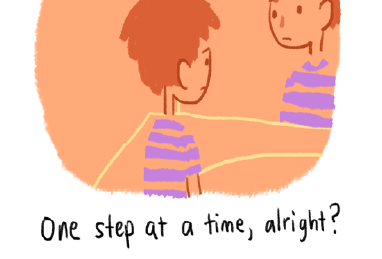Support for the Supporters
Chanon Wongsatayanont has tips to make helping friends easier

This is the mental health awareness week and I’ll focus on a slightly different but related angle today. In welfare, mental health is a much discussed issue with ever-increasing helpful resources, but there is a group of people often left out from the media spotlight. These are the friends who support friends with eating disorders, those in relationships who lighten up their partner’s depression, or parents who calm their child with anxiety, to name a few examples.
Considerate friends and family make every effort to understand and accommodate their loved ones with mental conditions. Unlike professional supporters, they often have little to no training themselves, willing to learn by patient trial-and-error, consulting online forums or call centres, just so they can help their loved ones however they can.
It’s not easy and can be quite taxing for the friends and family. Outsiders might think it’s simply about “listening” and “being there” for those who need it. But that’s a huge over-simplification; mental conditions aren’t like “feeling down” where a good heart-to-heart talk can fix everything. It’s a sustained commitment, helping the sufferer through the ups and downs of the condition, trying to be understanding even when they don’t quite understand what’s asked from them. Especially as friends and family, they know that their loved ones rely on them.
So to help the supporters, I’ve compiled a list of tips and things to bear in mind in order to make it easier.
It’s not you, it’s not me
Sometimes, supporters can be hurt by what their loved ones say during their phase. For depression, the sufferer might go silent for days until you think that you’ve done something wrong. During an anxiety attack, they might burst out with insensitive accusations because they’re feeling overwhelmed by their emotions. What makes it particularly sting is because they’re so unlike their usual character.
You should understand that this is the condition talking, not them. And don’t feel guilty too because it’s not your fault. The sufferer will often come to their loved ones to apologise after the phase, for it is never their intention to hurt the people they also love (perhaps even more than themselves in the worst of times).
Depression, anxiety and bipolar disorder cloud the mind, crippling it with hopeless or a rush of thoughts that couldn’t be turned off. Even subtler conditions such as eating disorders can plant doubts and false assumptions in your head, making it feel like it’s the most obvious truth. They’ve got their hands full to overflowing dealing with the thoughts in their head.
Therefore, distancing yourself from the disruptive condition might be the best way to prevent yourself from getting hurt when trying to help. It can be as simple as attributing the hurtful things said to the illness itself, trying not to get your feelings involved as you comfort them. By doing this, you don’t care less about them. In fact, it makes you a more effective supporter, because you’ll focus on the issue at hand.
Know that they are suffering
Going through the lows of the illness is not something they’d choose to feel if they could help it. They are in the grips of their thoughts, driven on by the condition, and it is a horrible feeling that they can’t control.
As you support your friends or family members, it helps to remember that it is not a choice or overreaction, but something involuntary. Sometimes, they would communicate that they need help with it when it is too much for them to bear alone, but sometimes it is possible that the sufferer prefers to stay quiet and cope with it themselves so it wouldn’t become worse.
Regardless, I want to remind you that by sharing their vulnerabilities and suffering, they are placing a lot of trust on you on a sensitive topic, which shows how much they appreciate you.
It will pass
Mental illnesses usually come in phases. For example, depression oscillates between normal and relapse periods. For some people, these occur every week for a few days at a time. For others, they last for weeks but occur only once every few months. As someone close to the sufferer, you’ll know this better than most or begin to notice patterns that aren’t yet confirmed. So even when you feel worn down, do remember that it is not always this way.
Don’t let it define your relationship
There’s a misconception about living with people with mental illness where it’s believed that the supporter has to spend all of his or her time supporting the sufferer. This is far from the truth, as you’ll probably realise from the ‘it will pass’ section.
It will only be a small part of the relationship, such as how a couple where one person is suffering from depression can hang out and travel just as much as everyone else, and is in need of support every once in a while. Sure, you might not be able to do certain things when one is suffering an episode, but the intimate understanding and trust make the relationship special in its own way.
Plus, despite the fact that these conditions stay with a person throughout their lives, things don’t always have to be the way it currently is. Loved ones can significantly help in developing mechanisms that helps sufferers to cope. As they are familiar with the onset, they can remind the sufferer that a phase is coming in so they can stop the onset of an anxiety attack before it spirals out of control. It will be a constant fight against this illness, but you both can get better at beating it.
I hope the tips are helpful to the kind friends and family supporting their loved ones through their personal struggle.
If you have specific questions, there are a lot of guides available online that are geared towards supporters
More importantly, the call centres listed on the side can also be helpful for the supporters as well as sufferers. Remember that people on the other end of the phone are also supporters. It’s their job. So they could truly understand and sympathise what you’re going through.









